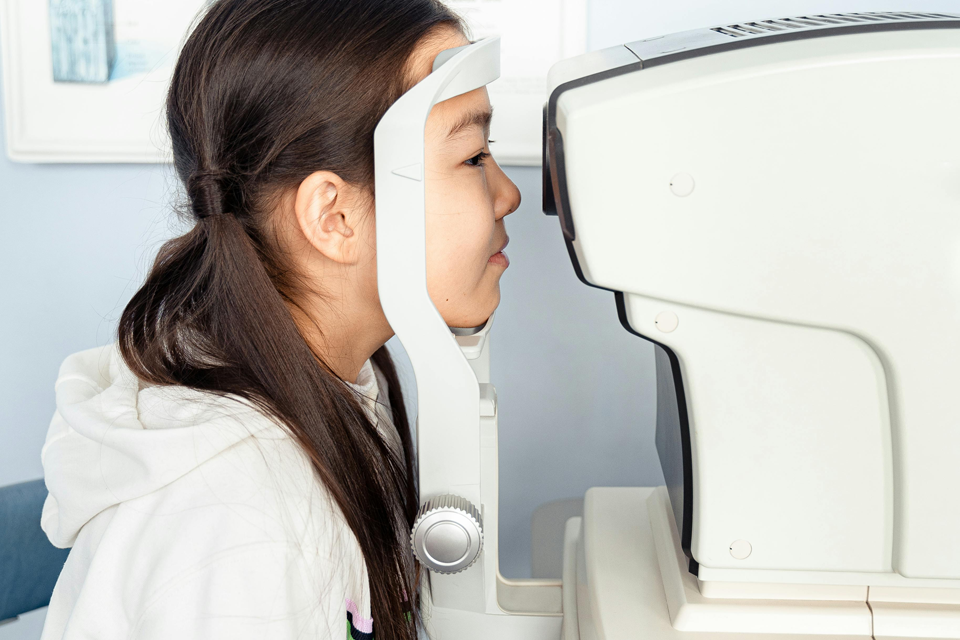Myopia, also known as short-sightedness, is a vision condition that makes distant objects appear blurry. It usually begins in childhood and can worsen as your child grows. If one or both parents are myopic, there’s a greater chance your child will be too. However, even without a family history, many children are becoming short-sighted.
Experts refer to the surge in cases as the “myopia boom,” with countries like those in East Asia seeing up to 90% of teenagers affected. The good news is: early intervention helps.
At Rawlings, we are proud to be leaders in Myopia Management in the UK. As an award-winning independent optician, we were among the first in the country to offer clinically proven myopia control treatments including MiSight® 1 day contact lenses, NaturalVue, MYLO soft lenses, Ortho-K (Orthokeratology) and MiYOSMART spectacle lenses by Hoya. Our focus is on early intervention to slow myopia progression, reduce the risk of high prescriptions, and protect your child’s long-term eye health – myopia is linked with higher rates of eye disease in adulthood. Career opportunities can be limited by short-sightedness, so as well as affecting long term eye health, myopia can affect life choices too.


Modern lifestyles are strongly linked to rising myopia rates. Key contributing factors include:
Spending just two hours outside daily can significantly reduce your child’s risk of developing myopia.
There’s no cure for myopia, but proven treatments can slow its progression. At Rawlings, we offer a wide choice of safe, effective myopia management solutions tailored to your child’s needs.
At Rawlings we have the freedom to use a variety of specialist treatment contact lenses. As well as MiSight daily disposable, the longest studied lens available, we also have access to Mylo and Naturalvue soft disposable lenses as well as Ortho-K. With daily disposable and specialist high prescription lenses available, we can use the best lens for your child.
Glasses are a preferred choice for some children. MiYOSMART lenses from Hoya are lightweight, and use D.I.M.S. technology. These lenses have been shown in clinical studies to reduce the progression of myopia by up to 60% over two years offering a similar success to contact lenses.
Overnight lenses which gently mould the contour of the eye whilst asleep, Ortho-K lenses are removed on waking for clear vision all day without needing to wear contact lenses or glasses during the day. Offering the ultimate daytime freedom with the added benefit of slowing myopia progression, this is the most popular choice across Asia and is increasingly chosen in the UK. Available in Hampshire and Surrey at our Purley and Winchester branches.
We advise caution with unproven remedies such as pinhole glasses, eye exercises, or behavioural therapy. These methods lack clinical validation and do not meet the standards of modern optometric care.
Bifocal glasses and visual therapy are useful in selected cases where eye muscle coordination is an issue. These treatments offer support but are not the first line of defence in slowing myopia progression.
Low dose atropine drops, although available across Asia, are not freely available in the UK currently and there is currently no proprietary MHRA licensed low atropine drop available from UK pharmacies. We expect this to change in the coming years as wider studies on all ethnicities are complete and manufacturers are likely then to release appropriate products.
At Rawlings, we have over 130 years of clinical experience and were among the first opticians in the UK to offer myopia control solutions like MiSight, MYLO and MiYOSMART. All our Optometrists are certified in myopia management and regularly attend training to stay ahead of the latest advances.
As an independent optician, we provide personalised, high-quality care focused on your child’s long-term vision and lifestyle. Whether you’re searching for “myopia treatment near me” or want advice from a trusted expert, Rawlings is here to help.
Not sure whether your child is developing myopia? These tools can help:
Early detection is key to successful management.

Whether your child is just starting to wear glasses or already has a high prescription, or if you just want them checked because you are short-sighted yourself, we’re here to help. Book an appointment at your local Rawlings branch and discover how our tailored treatments can safeguard your child’s vision.
Contact us today to schedule an appointment and take the first step toward a clearer, healthier future for your child’s eyes.
Rawlings is a long-established independent business serving the communities of twelve towns in Hampshire and Surrey, where we have built a strong reputation for the quality of our professional expertise and service.
Rawlings & Sons (Opticians) Limited is registered in England and Wales No 02862381. Rawlings & Sons (Opticians) Limited are a credit broker and not a lender. We offer credit products from Mitsubishi HC Capital UK PLC trading as Novuna. Rawlings & Sons (Opticians) Limited is authorised and regulated by the Financial Conduct Authority FRN 990854. Credit subject to age and status. Finance is only available for audiology products The interest free plans which are repayable within 12 months and in no more than 12 instalments are not regulated by the Financial Conduct Authority. Unregulated plans are not covered by the Financial Ombudsman Service.
© Rawlings Opticians 2026 Contact | Privacy Policy | Feedback | FAQ | Complaints | Disclosure Statement | Cookies Policy
Contact | Privacy Policy | Feedback | FAQ | Complaints | Disclosure Statement | Cookies Policy
© Rawlings Opticians 2026